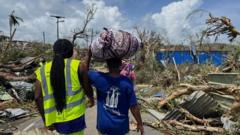The International Court of Justice is initiating hearings to examine the obligations of nations under international law regarding climate protection amid escalating global warming. This landmark case, requested by the UN General Assembly, aims to address potential legal actions against polluting nations and evaluate the consequences of governmental negligence in addressing climate risks.
International Court of Justice Tackles Climate Change in Historic Hearings

International Court of Justice Tackles Climate Change in Historic Hearings
Hearings at the International Court of Justice mark a significant step towards clarifying international responsibilities in combating climate change.
The International Court of Justice (ICJ), recognized as the United Nations' premier judicial body, is about to commence its inaugural hearings concerning climate change. These proceedings are being held in response to a petition from the UN General Assembly that requests clarification on two pivotal questions: the responsibilities of governments in safeguarding the climate system and the ramifications of failing to fulfill these obligations. This marks a critical development as the world grapples with rising temperatures and extreme climate events.
The hearings will unfold over two weeks at the ICJ's headquarters in The Hague, where a panel of 15 judges will deliberate on the responsibilities of nations regarding greenhouse gas emissions and climate action. This case emerges against the backdrop of three decades of global scientific warnings and numerous international negotiations aimed at curbing harmful emissions.
Recent discussions at COP 29, the latest UN climate summit held in Baku, Azerbaijan, have intensified focus on the financial aspects of transitioning from fossil fuels to sustainable energy sources. The outcome of these hearings could establish a judicial precedent that guides future climate policies and frameworks for accountability among high emitters. As nations convene to address urgent climate challenges, the world watches closely to see how the ICJ will interpret international law in the context of environmental stewardship.






















